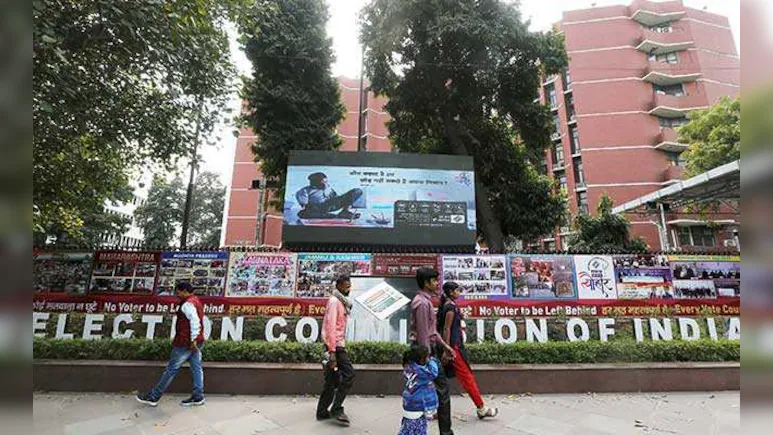Election Commission Targets Non-Active Political Parties in Sweep of Delisting Measures
In a significant move aimed at streamlining the political landscape, the Election Commission of India has initiated the delisting process for 345 registered unrecognized political parties (RUPPs). This action comes in response to these parties’ failure to contest any elections since 2019, marking a period of six years of inactivity. The decision stands as a part of the Election Commission’s broader effort to ensure that only active and engaged political entities exist within the system, shedding light on the necessity for political accountability and voter representation.
The delisting process began on Thursday, and the Election Commission has expressed that the identified parties have not only failed to engage in elections but also lack a verifiable physical presence. Many of these parties cannot be located at their registered addresses, raising questions about their operational legitimacy. According to the Election Commission, there are currently over 2,800 RUPPs registered with them, but a considerable number have not met essential conditions to maintain their status as recognized entities.
This announcement is particularly significant given the dynamic political landscape of India, where the presence of active political parties is crucial for a functioning democracy. The core mission of the Election Commission is to ensure credible and effective elections, and the removal of inactive parties serves to clarify the political field for voters.
Who Are Affected?
The decision to delist these 345 RUPPs impacts political entities scattered across various states and Union Territories throughout India. With such a high number of parties being targeted for removal, it indicates a systemic issue regarding the registration and activity levels of political organizations. The Election Commission has long upheld the importance of active participation in the government and electoral processes, and this move aims to reaffirm that principle.
What Actions Are Being Taken?
The Election Commission has officially commenced proceedings to remove these inoperative parties from their registry. By delisting these parties, the commission aims not only to clean up its registered list but also to encourage political activism among those parties that remain. This action is a reminder to existing political entities of the importance of engaging with the electorate and fulfilling their responsibilities as representatives.
Where Are These Parties Registered?
The affected parties come from various regions of India, including states and Union Territories that are home to both recognized and unrecognized political parties. The Election Commission has not disclosed the specific states or parties involved, as the focus remains on the overall necessity for active political participation.
When Did This Move Come Into Effect?
The decision was announced on Thursday, with the proceedings beginning immediately. The last time these parties participated in elections was in 2019, making their inactivity over the past six years a significant factor in this decision. The continued lack of participation underscores the challenges facing smaller and unrecognized parties in engaging effectively with the electorate.
Why Is This Important?
The delisting of inactive political parties has far-reaching implications for the integrity of the electoral process in India. The Election Commission’s actions highlight its commitment to maintaining a vibrant democratic fabric, encouraging active participation, and ensuring that the political landscape is not cluttered with ineffective entities. This move not only aims to preserve the integrity of elections but also seeks to inspire registered parties to mobilize voters and engage more actively in civil society.
How Will This Impact the Political Environment?
The implications of this decision by the Election Commission are manifold. By eliminating inactive parties from its roster, the commission not only promotes a healthier electoral environment but also raises the stakes for those remaining affiliated political parties. The act of delisting reinforces the responsibility of political parties to engage with their constituents actively. As the political environment continues to evolve in India, this decision could spur increased activity and initiative among political groups, encouraging them to contest elections actively and play a meaningful role in governance.
The ramifications of this decision extend beyond the immediate context of these 345 parties. It raises critical questions about the nature of political participation in India, particularly for smaller, unrecognized parties seeking a foothold in a competitive landscape dominated by larger, more established entities.
Future Outlook for Political Parties
As per the report by NDTV, the Election Commission’s move is a wake-up call for all registered political parties to re-evaluate their engagement strategies. For voters, the delisting may change how they perceive political representation in their regions, as the landscape clarifies and becomes more streamlined.
Political analysts suggest that the consolidation of the party landscape may lead to a more focused and effective electoral process, where the voices of engaged political entities are amplified while ineffective parties are phased out. This could potentially foster a more robust dialogue about policies and governance, as active parties seek to gain the trust and votes of the electorate.
The push for accountability within the political system is not just about removing dead weight; it’s about fostering a culture of participation that resonates with citizens. Voters may become increasingly discerning, demanding more from those who represent them, ultimately leading to better governance.
Exploring Related Topics in India’s Political Sphere
In the ever-evolving political landscape of India, the Election Commission’s actions in delisting unrecognized parties highlight a significant shift towards ensuring that every registered political entity has a role in fostering democracy and engaging with citizens. The future of India’s political environment seems poised for transformation as active participation becomes not just encouraged, but expected.
DISCLAIMER
We have taken every measure to ensure that the information in this article and on our social media platforms is accurate, verified, and obtained from reliable sources. For feedback or complaints, please contact us at info@hamslive.com.


